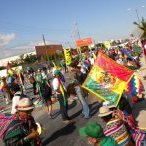
8 December 2010 | Interviews | Climate Justice and Energy | COP 16
Keepers of Life
The voices of the peoples at the climate negotiations in Cancun
Download: MP3 (2.3 Mb)
Recognizing the rights of the people and taking care of nature to avoid the worsening of the environmental crisis are issues that are worrying the social movements participating in the activities parallel to the COP16 in Cancun.
These issues were raised on Tuesday at the Assembly of the Movements which took place in Cancun, near the Moon Palace Hotel, where the official negotiations are being carried out.
“We are here so that our rights are recognized and our territories are not put at risk”, said Miguel Palacin, member of the Andean Coordination of Indigenous Organizations (CAOI) to Real World Radio.
CAOI has participated in Cancun in the International Forum of Indigenous Peoples on Climate Change (Global Caucus), with delegations representing over 360 million people. Palacin said that “indigenous peoples have the right to free, prior and informed consent” with reference to the projects to be installed in their territories.
The indigenous leader also said that developed countries need to reduce their polluting emissions before thinking of other solutions to climate change. He made reference to the Reducing Emissions from Deforestation and Forest Degradation in Developing Countries (REDD) mechanism. “We reject REDD because through it the climate crisis serves to benefit the interests of transnational corporations”, said Palacin. “They want to create a fund and that peasants and indigenous people become forest rangers, but they don´t think about our development”, he added.
The CAOI´s representative talked about the traditional knowledge of indigenous peoples as a tool to fight against climate change. “Our knowledge is so vast, we have preserved Pachamama and we want this to be the means to solve this crisis, not business”. Palacin also said he was “disappointed” with the UN process of negotiations and highlighted that “any agreement must include the full and effective participation of indigenous peoples”.
Meanwhile, Sonia, from the Movement of Dam-Affected Peoples of Brazil (MAB), was the first to speak on behalf of La Via Campesina in the Assembly of Social Movements.
The leader said that only the ALBA countries (Bolivarian Alliance for the Americas) have progressive positions in the negotiations, because they have “another alternative project of life”. She said that the capitalist system is in a deep crisis and needs “other things to profit”. This is why they are “trying to turn climate into a commodity”, she said.
The representative of La Via Campesina said that the peoples are the “way out” of the climate crisis, “because we have historically taken care of and defended Mother Earth and the rights of the peoples of the world”. “The seeds we have now, the water, the lands, we take care of them as our own lives. We are the keepers of the biodiversity of humankind”.
Sonia highlighted the struggle in defense of nature and said that “it needs to be much more globalized”, because “the enemy is globalized”. She also raised the need to join social movements and the challenges of working at national level. “We face some challenges when we go back to our countries, to join the social movements, to build the political capacities of the young people”, said Sonia. “We are committed to give our lives, our blood to save the next generations”, she concluded.
Photo: Real World Radio







